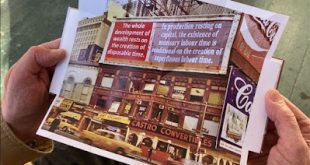At the Columbia Center for Contemporary Critical Thought Marx 9/13 session on the Grundrisse last night, I asked a question from Zoom that cannot be heard on the Youtube video because of technical difficulties. I will try to reconstruct the jist of the question here along with a bit of context. I apologize if the reconstruction of my question is a bit more coherent than the original, which was made unintelligable by a time delay and apparent distractions in the audience.In his presentation,...
Read More »The Theory of Crisis: Sandwichman’s and Uno Kōzō’s (both Marx’s)
Just what is it that makes Marx's contribution so different, so appealing?Marx revealed the dark secret of classical political economy: that the writers in that tradition assumed the ubiquity of a distinctive economic sphere that was, in fact, unique to and characteristic of capital. To them capitalism was eternal and earlier forms of society were simply incomplete in their striving toward the absolute. By breaking with that tradition, Marx was able to more completely grasp the dynamic of...
Read More »The Theory of Crisis: Kōzō Uno’s and Sandwichman’s
Every few days I check my dormant eX-twitter account to see if there were any replies to old posts. A great series of questions showed up a couple of days ago.Neon Nova asks:Sandwichmann, would you consider yourself a follower of Dilke? What does Marx offer that Dilke doesn't? I know Marx revisits some of Dilke's ideas on leisure time, but do you think there are flaws in Marx's approach? Does Dilke ultimately surpass Marx in your view?I've noticed you've traced Dilke's views on leisure time...
Read More »Hot off the press… and cut… and fold… and glue. It’s Amazing!
“It’s amazing.”“It’s incredible!”“Cool!”“Best book of 2024.”“This is an amazing and unique work of art.”“Your book is a thing of beauty and will be my joy forever. There’s something wonderful about a pop-up book in 2025.”“Excellent, Tom. Brilliant way to bring the text to life. Well done (as always)!”“It is not only beautiful and ingenious but itself a theoretical contribution.”“It's amazing, a lot of work!”“I love it! What a creative and penetrating way to communicate Marx's core...
Read More »On the politics that would make a post-growth transition possible
To the co-authors of “Post-growth: the science of wellbeing within planetary boundaries,” published in The Lancet Planetary Health:Thank you so much for the valuable work you have all done surveying the field of post-growth research. In the conclusion of your article, you observe "...we still know little about the politics that could make post-growth transitions possible in reality." I would like to address that issue here. While I don't presume to have all the answers, I believe I can help...
Read More »A thing of beauty is a joy forever
Above, from On Biblical Subjects, by Robert Dodsley, a lift the flap illustrated manuscript circa 1720 (sold for £20,000 in 2021). Robert Dodsley's son - also named Robert Dodsley - published a volume of "Old English Plays" in 1744. In 1816, Charles Wentworth Dilke published volume two of his Old Plays, being a continuation of Dodsley's collection. Rodwell and Martin on Bond Street was the publisher. They also published Dilke's The Source and Remedy of the National Difficulties, deduced from...
Read More »Klaus Fuchs, Max Beer, and Our Anonymous Pamphleteer
Klaus Fuchs makes only a cameo appearance in this tale. But because he is far better known than Jürgen Kuczynski, his relationship to the latter helps establish the milieu in which our main character operated.Fuchs is routinely referred to pejoratively as a "spy" who "stole" atomic secrets. A more nuanced view of his activities was offered by Sir Dick Goldsmith White, Director General of MI5 from 1953 to 1956, and Head of MI6 from 1956 to 1968: "He was a scientist who got cross at the...
Read More »The more this contradiction develops…
The more this contradiction develops, the more does it become evident that the growth of the forces of production can no longer be bound up with the appropriation of alien labour, but that the mass of workers must themselves appropriate their own surplus labour.
Read More »Behind the Billboards
IMOGEN CUNNINGHAM: Roi had to restrain himself on art because after the birth of the twins he was at Foster and Kleiser, billboard advertising. Because they knew that I had a camera and was a photographer, they asked him to do billboards. You know, to go out and photograph them. He did very good shots. And all I could see of it was from Twin Peaks. He would tell me in what direction the light was. I guessed at the exposure. He did it on 4 x 7 film and he did a darned good job. He took it...
Read More »The Book is Not for Selling.
"This is an amazing and unique work of art." – Martin Nicolaus.I had my first inquiry from someone who wanted to buy a copy of my new pop-up book. This presented me with a dilemma because I had never intended to sell copies of the book. The rationale for not selling appears in the book – on pages eight and eleven. The nature of capital is that "real wealth must take on a specific form distinct from itself, absolutely not identical with it, in order to become an object of production at all."...
Read More » EconoSpeak
EconoSpeak






